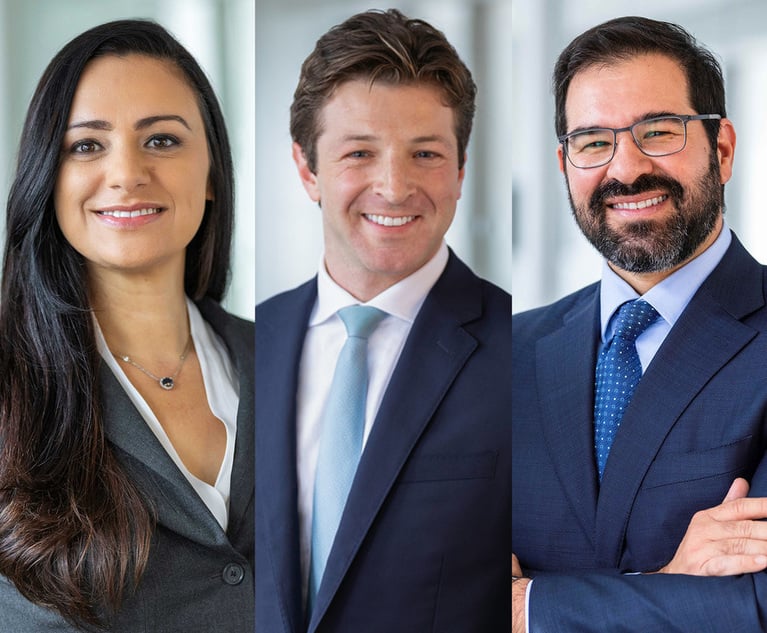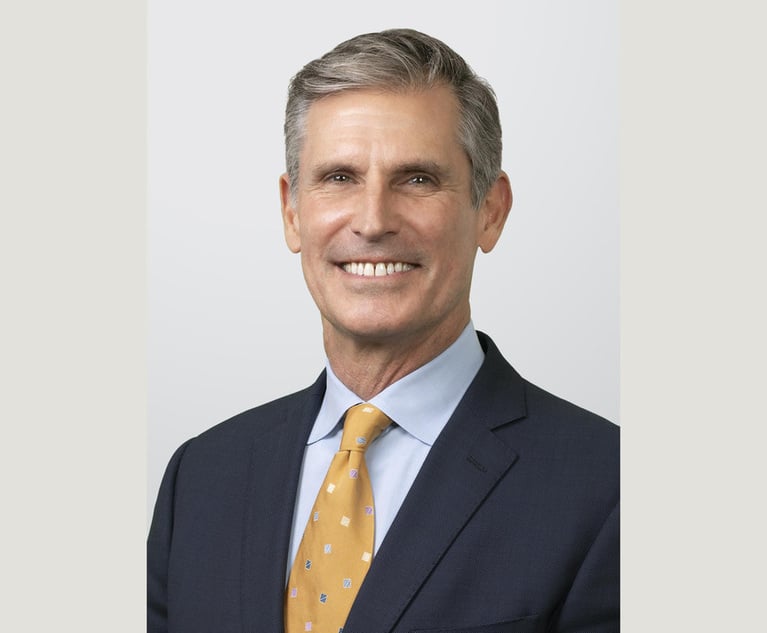Specialization at Weiss Serota Still Giving Midsize Firm an Edge
The firm promotes itself as having the expertise and capability of big firms, while still having the efficiencies of a midsize firm.
January 16, 2018 at 06:32 PM
4 minute read
 Mitch Burnstein, managing director of Weiss Serota Helfman Cole & Bierman in Miami.
Mitch Burnstein, managing director of Weiss Serota Helfman Cole & Bierman in Miami. When three Am Law 100 lawyers formed Weiss Serota Helfman Cole & Bierman in 1991, they chose to specialize in an area they saw needed better representation: South Florida's public sector.
As the region's legal market evolved to include competition from plenty of Am Law 100 firms, Weiss Serota thrived in part by marketing itself on that philosophy of specialization, according to the firm's new managing partner, Mitch Burnstein.
The firm boasts 70 attorneys and clients that include dozens of municipalities, as well as corporate and private clients, on matters ranging from government relations to real estate land use, and from communications to government law.
Burnstein said being a midsize firm is an advantage in that space because it allows the firm to be nimble and responsive to client needs instead of trying to cover every practice area like many larger firms. The firm promotes itself as having the expertise and capability of big firms, while still having the efficiencies of a midsize firm.
Burnstein, a former Broward County assistant state attorney and Florida assistant state attorney general, grew up in the area and now specializes in eminent domain. He took Weiss Serota's reins earlier this month after 10 years as the firm's Broward office managing partner. Burnstein grew up in Hollywood in a home where both his parents were lawyers. His mother was Broward County's first female circuit judge.
Burnstein said the Weiss Serota management philosophy is based on the understanding that the firm includes lawyers that could be at Am Law 100 firms.
“Our lawyers have options, so from a management standpoint we do emphasize providing opportunity for career advancement,” Burnstein said.
Part of retaining and attracting staff involves being aware of workplace trends. For example, today's employees, particularly younger millennials, change jobs and industries more frequently and demand greater flexibility in the workplace.
“Employees have a different mindset in the aftermath of the Great Recession and health insurance crisis and travel demands,” he said. “Employees demand greater flexibility in their workplace. … We want to provide opportunities to them. We provide independence and flexibility. We try to mentor and foster collaboration.”
One way the firm is trying to give its lawyers independence and flexibility is with technology.
“Since people are out and about, particularly young attorneys, it would be nice to make time entries for billable time on a smartphone,” Burnstein said. “We're beta testing an app that integrates with our time management software to allow them to manage their time and bill their time via a smartphone.”
The firm is also changing its 401(k) platform, and one of the requirements for the new platform is that plan participants are able to change their investment elections and contributions through their smartphones.
He said the firm is undergoing an information technology audit to protect itself from any issues that may bring.
While mid-career employees like Burnstein, who is 53, aren't likely to change their 401(k)s on their phones, younger employees want that option.
The firm has also converted its kitchen areas, turning them into collaborative cafes with refreshments, surrounded by art and areas with comfortable couches and round tables to encourage collaboration and discussion of cases, clients and even weekend plans, Burnstein said.
“We find that we get more bang for the buck through collaboration,” he said. “In the long run, we find that the work and the mentorship that is being delivered is enhanced.”
This content has been archived. It is available through our partners, LexisNexis® and Bloomberg Law.
To view this content, please continue to their sites.
Not a Lexis Subscriber?
Subscribe Now
Not a Bloomberg Law Subscriber?
Subscribe Now
NOT FOR REPRINT
© 2025 ALM Global, LLC, All Rights Reserved. Request academic re-use from www.copyright.com. All other uses, submit a request to [email protected]. For more information visit Asset & Logo Licensing.
You Might Like
View All
Florida Judge Denies Motion to Dismiss in $150M Plane Crash Lawsuit Involving Flow La Movie
3 minute read

Holland & Knight Expands Corporate Practice in Texas With Former Greenberg Traurig Partner
3 minute read
Forum Clause Axes $844M Case Against Reinsurer Over Deadly Plane Crash, Judge Rules
Trending Stories
- 1'A Waste of Your Time': Practice Tips From Judges in the Oakland Federal Courthouse
- 2Judge Extends Tom Girardi's Time in Prison Medical Facility to Feb. 20
- 3Supreme Court Denies Trump's Request to Pause Pending Environmental Cases
- 4‘Blitzkrieg of Lawlessness’: Environmental Lawyers Decry EPA Spending Freeze
- 5Litera Acquires Workflow Management Provider Peppermint Technology
Who Got The Work
J. Brugh Lower of Gibbons has entered an appearance for industrial equipment supplier Devco Corporation in a pending trademark infringement lawsuit. The suit, accusing the defendant of selling knock-off Graco products, was filed Dec. 18 in New Jersey District Court by Rivkin Radler on behalf of Graco Inc. and Graco Minnesota. The case, assigned to U.S. District Judge Zahid N. Quraishi, is 3:24-cv-11294, Graco Inc. et al v. Devco Corporation.
Who Got The Work
Rebecca Maller-Stein and Kent A. Yalowitz of Arnold & Porter Kaye Scholer have entered their appearances for Hanaco Venture Capital and its executives, Lior Prosor and David Frankel, in a pending securities lawsuit. The action, filed on Dec. 24 in New York Southern District Court by Zell, Aron & Co. on behalf of Goldeneye Advisors, accuses the defendants of negligently and fraudulently managing the plaintiff's $1 million investment. The case, assigned to U.S. District Judge Vernon S. Broderick, is 1:24-cv-09918, Goldeneye Advisors, LLC v. Hanaco Venture Capital, Ltd. et al.
Who Got The Work
Attorneys from A&O Shearman has stepped in as defense counsel for Toronto-Dominion Bank and other defendants in a pending securities class action. The suit, filed Dec. 11 in New York Southern District Court by Bleichmar Fonti & Auld, accuses the defendants of concealing the bank's 'pervasive' deficiencies in regards to its compliance with the Bank Secrecy Act and the quality of its anti-money laundering controls. The case, assigned to U.S. District Judge Arun Subramanian, is 1:24-cv-09445, Gonzalez v. The Toronto-Dominion Bank et al.
Who Got The Work
Crown Castle International, a Pennsylvania company providing shared communications infrastructure, has turned to Luke D. Wolf of Gordon Rees Scully Mansukhani to fend off a pending breach-of-contract lawsuit. The court action, filed Nov. 25 in Michigan Eastern District Court by Hooper Hathaway PC on behalf of The Town Residences LLC, accuses Crown Castle of failing to transfer approximately $30,000 in utility payments from T-Mobile in breach of a roof-top lease and assignment agreement. The case, assigned to U.S. District Judge Susan K. Declercq, is 2:24-cv-13131, The Town Residences LLC v. T-Mobile US, Inc. et al.
Who Got The Work
Wilfred P. Coronato and Daniel M. Schwartz of McCarter & English have stepped in as defense counsel to Electrolux Home Products Inc. in a pending product liability lawsuit. The court action, filed Nov. 26 in New York Eastern District Court by Poulos Lopiccolo PC and Nagel Rice LLP on behalf of David Stern, alleges that the defendant's refrigerators’ drawers and shelving repeatedly break and fall apart within months after purchase. The case, assigned to U.S. District Judge Joan M. Azrack, is 2:24-cv-08204, Stern v. Electrolux Home Products, Inc.






